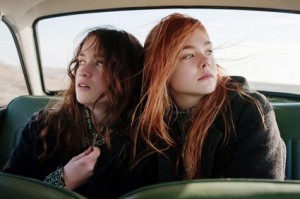

By Kim Voynar Voynar@moviecitynews.com
TIFF12 Review: Ginger & Rosa
Elle Fanning delivers an astonishing performance as Ginger, one-half of the titular characters in Ginger & Rosa, Sally Potter’s gorgeously shot and thoughtfully executed story of a young girl growing up in early-’60s London, raised to be a free-thinking activist, who’s growing up in the shadow of the Cold War. Ginger and Rosa (Alice Englert), born on the same day, if not quite under the same star, are the best of friends, inseparable in all they do. Rosa’s father took off when she was small, leaving Rosa’s mother to raise her alone; both Ginger and Rosa chafe against the banal domestic imprisonment in which they feel their mothers are trapped.
Ginger’s father, Roland (Alessandro Nivola) is present, but offers little in the way of moral guidance or structure, being himself wrapped up in preaching anti-establishment morals and nudging his daughter toward the same rebellion that drives him, while positioning himself on a higher-than-though intellectual and moral perch to justify his abhorrent choices in his personal life. Ginger’s mother, Natalie (Christina Hendricks) tries to offer her intelligent, recalcitrant daughter guidance and discipline, a task rendered nearly impossible by Ginger’s hero-worship of her more lenient father, which forever puts Natalie in the position of playing the bad cop parent.
Ginger and Rosa rebel in their own way, Ginger usually following Rosa’s lead as they pick up boys, hitchhike, experiment with smoking, and such — but she’s just as likely to have her nose buried in a book while Rosa’s engaged in making out. Ginger’s very much more the serious and introspective of the friends, a deep thinker who aspires to grow up to be a poet, if only the grownups don’t blow up the world first with a nuclear bomb. Ginger begins to mature from thoughtful, but shallower school-girl into an intelligent and inquisitive young woman, her worries about the bomb and the future of the world grow all consuming, while Rosa grows into a much more shallow sort of young woman, bent on seeking out hedonistic pleasures and absorbed with flaunting her budding, womanly body to whatever boys or men will look, particularly Roland, for whom she develops what some might consider an inappropriate fixation or misguided daddy attachment, albeit one that’s equally inappropriately returned.
Also on the scene are a trio of delightful members of the ’60s lefty intelligentsia: Oliver Platt and Timothy Spall as Ginger’s gentle, intellectually passionate godparents, and Annette Bening as a brash, plain-talking feminist activist who takes Ginger under her wing, encouraging the girl’s own budding activism and taking on a bit of a surrogate mother role to the girl as her relationship with her mother deteriorates. As things spiral out of control in Ginger’s live, her fragility and anxiety cause her to obsess and worry more and more, until an unexpected turn forces her to confront her respective views of what kind of people her parents really are, and to re-evaluate her lifetime friendship with Rosa, which grows increasingly strained.
Ginger & Rosa is Sally Potter’s best film in years, some might say the best (or at least the most broadly accessible) film she’s ever made. Certainly it’s gorgeous to look at, having been shot by Robbie Ryan, Andrea Arnold’s cinematographer, who keeps his lens frequently very tight, all the better to read the nuances of Fanning’s performance. Spot-on period production design by Carlos Conti, who also handled design for Walter Salles’ On the Road, immerses the viewer in 1962 London, with seamless editing by Anders Refn (Breaking the Waves, Antichrist) keeping the story flowing along at a nice clip.
The leftist bent of the characters and some heavy-handed nuclear symbolism might seem to imply that Potter’s reaching for a bigger message here, but really, this is a heavily character-driven story about these two young girls whose lifetime friendship grows threatened as they grow in separate directions, and, especially, a coming-of-age story about Ginger, who learns things along the way that force her to reassess all the things she thought she knew, about her parents, about friendship, and about life. As such, Ginger & Rosa isn’t as broadly reaching as many of the films I saw at TIFF this year, but really, do they all have to be? Sometimes a thoughtful, smart, deeply affecting character study is just what you need, whether you’re wending your way through the mammoth schedule at TIFF, or looking for a great arthouse film in which to immerse yourself.
Performances are beautifully acted and solidly directed all the way around, but that Elle Fanning, wow. Just thirteen when this film was shot, she delivers a range and depth that’s astonishing, though not especially surprising to anyone who’s been following her evolution as an actor, particularly starting with her 2008 turn in Phoebe in Wonderland. This is a young lady already stamping her mark on the film world, and her prospects only look brighter and brighter with every film, with Ginger & Rosa definitively another step in the right direction.















